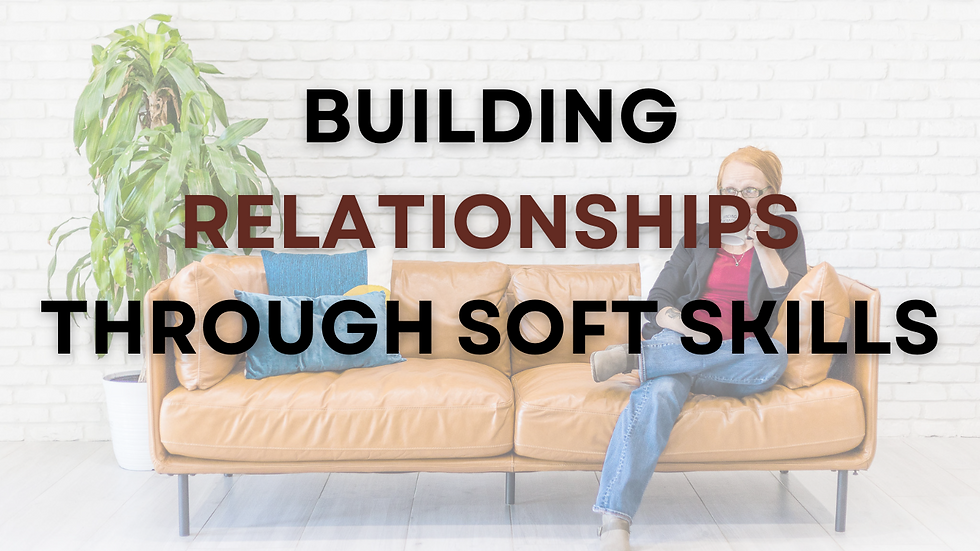Building Relationships Through Soft Skills
- Sara Lowell
- Feb 1
- 4 min read

What if I told you that your business is more than the technical skills you have but more about really building relationships? I’m sure you’ve heard it time and time again that relationships are the key to building and running a successful business.
Well, it is true.
It does not matter the industry you’re in or what role you’re in, your ability to build strong relationships can make or break your success. When you’re working with clients, how did you get there?
That past job that you had, how did you land that gig? Sure, you might say it was your experience but more often than not, it’s your soft skills. While technical skills (hard skills) show that you’re able to do tasks, etc, it's your soft skills that will determine how well you connect with others, collaborate and create lasting relationships.
Soft skills—such as communication, emotional intelligence, adaptability, and empathy—play an important role in how you interact with everyone you come in contact with.
Ok, so you wanna know why these soft skills matter and how you can improve on these skills, then read on.
Why Soft Skills Matter in Relationship Building
In business, relationships are everything. Whether you're working with a team, pitching to investors, or serving customers, your ability to connect on a personal level influences trust, loyalty, and long-term success. Here’s how key soft skills contribute to strong relationships:
Communication: Clear and effective communication ensures that messages are understood, reducing misunderstandings and fostering collaboration. Whether through written emails, verbal discussions, or nonverbal cues, the way you communicate sets the tone for your professional relationships.
You are reading this, right? This is a form of communication. Have a podcast? That is a form of communication. You’re emailing your clients and your team? That is communication.
Emotional Intelligence (EQ): Understanding and managing your own emotions while recognizing the emotions of others helps you navigate challenging situations with empathy. At times, of course this can be challenging because everyone is different but when you are self-aware, you’re able to take a step back and manage your emotions.
Imagine, you go into a meeting after having a bad morning and when you’re not aware of your emotions, the meeting gets messed up either because you’re not managing your emotions or you’re not communicating in a way that is understandable for those in the meeting. When you’re able to show emotional intelligence, you’ll build trust.
Active Listening: This goes back to communication. People want to feel heard. By practicing active listening—truly focusing on what someone is saying rather than just waiting for your turn to speak—you demonstrate respect and build stronger connections.
Adaptability: Not everything is going to stay the same. Being flexible and open to change not only helps you personally but also makes you a more reliable and valuable team member or leader. People appreciate those who can adjust and support them through transitions.
Conflict Resolution: Disagreements are part of any relationship and it’s up to you how you work on the conflict. The ability to handle conflict with a calm, solutions-oriented mindset strengthens relationships rather than damaging them.
How to Improve Your Soft Skills for Better Relationships
Building and refining your soft skills takes time and practice, but the effort pays off in stronger, more meaningful business relationships. Here’s how you can improve:
1. Be Intentional About Communication
Practice clarity and conciseness in emails, meetings, and presentations.
Pay attention to your tone and body language to ensure they align with your message.
Ask open-ended questions to encourage deeper conversations and show interest in others.
2. Develop Your Emotional Intelligence
Reflect on your own emotions and triggers to improve self-awareness.
Show empathy by putting yourself in others' shoes before responding.
Manage stress effectively so emotions don’t cloud your judgment.
3. Practice Active Listening
Maintain eye contact and avoid distractions when someone is speaking.
Paraphrase what the other person said to confirm understanding.
Resist the urge to interrupt or form your response while they’re still talking.
4. Be Adaptable and Open to Feedback
Embrace change as an opportunity rather than a setback.
Seek feedback from those you know and those you work with.
Be willing to adjust your approach based on the needs of the situation or team.
5. Strengthen Your Conflict Resolution Skills
Address issues promptly rather than letting them build up.
Focus on finding common ground rather than proving a point.
Use "I" statements to express concerns without placing blame (e.g., "I felt overlooked in the meeting" instead of "You ignored me").
The Long-Term Benefits of Relationship Building
You are enhancing every part of your life when you invest in developing your soft skills, along with creating an impact that will last a lifetime.
Strong relationships lead to:
Greater trust and loyalty from clients, partners, and employees.
Increased collaboration and teamwork that drive business success.
More opportunities for partnerships, mentorship, and career growth.
A positive work culture where people feel valued and motivated.
In the end, business is built on relationships, and relationships thrive on strong soft skills. By diving into those abilities, you set yourself up for long-term success, both professionally and personally.
Are you ready to take your soft skills to the next level? Start small—practice active listening in your next conversation, ask for feedback, or challenge yourself to improve your adaptability. The stronger your relationships, the stronger your business will be.
Want more insights and practical strategies to level up your leadership and soft skills? Join the Soft Skills Studio at only $17/month, where we go even deeper into soft skills, personal and professional development!
Let’s build better relationships, one conversation at a time.


Comments